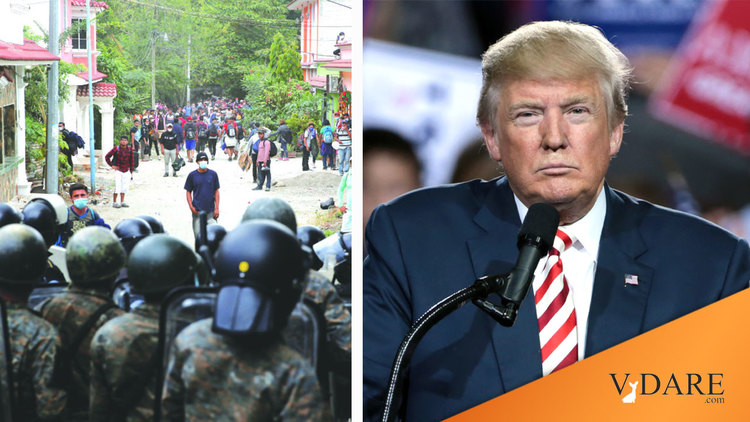


01/23/2021
One of the great accomplishments of the Trump administration was pressuring Mexico to crack down on the caravans of Central Americans (and others) passing through Mexico to get to the United States. This was followed by deals with Central American nations.
These policies helped prevent many illegals from even getting close to the U.S. border. They also demanded accountability from Latin American governments which for years had cynically been using the U.S. border as a human dumping ground.
Now that Biden is president, what can we expect? Will Biden put this kind of pressure on Latin American governments?
During the final days of the Trump administration, a "caravan" originated in Honduras, but was stopped in Guatemala. Thank you Guatemalans.
But what can we expect in the future?
The Washington Post ran an article the day before Biden’s inauguration on this very topic. It begins thusly:
Most of the thousands of migrants who left Honduras for the United States on foot last week have been turned around in Guatemala. By Tuesday morning [January 19], more than 3,000 had been detained or forcibly sent back by security forces.
Some in the caravan were aware that President-elect Joe Biden was days away from taking office in Washington and were hopeful that he would make it easier for migrants to enter the United States. But others were oblivious to the political context.
For most, it was their own plight — poverty, security threats, the pair of hurricanes that devastated the Central American nation — that compelled them to join the caravan. The show of force by Guatemalan authorities was yet another sign of the crackdown on migration through Central America and Mexico that has intensified at the behest of the Trump administration. [U.S.-bound caravan thwarted in Guatemala as pressure against migrants continues, by Kevin Sieff, Washington Post, January 19, 2021]
If we want to help Central Americans suffering from hurricanes and other natural disasters, it would be better to help them in their own country rather than use it as a pretext for mass movements northward.
For years, migrants saw joining a caravan as a safe and affordable alternative to paying a human smuggler, who might charge more than $10,000 for the journey north and mistreat them along the way. But the method no longer appears viable, as caravans now run headlong into a militarized response by Central American and Mexican security forces, under pressure from Washington and fighting a pandemic.
In the age of COVID-19, with our own citizens being affected by mask mandates, lockdowns, business closings and job losses, it makes no sense whatsoever to allow mass immigration.
The most recent caravan, the largest in a year, left from a bus station in the city of San Pedro Sula in northern Honduras on Friday [January 15]. The migrants included families whose homes were destroyed in the two hurricanes that swept through the country in November. Others had lost their jobs in hotels and restaurants on the island of Roatán, frequented by tourists until the coronavirus pandemic. Still others were fleeing acute threats from violent criminal gangs.
Yes, Honduras has been adversely affected by hurricanes, loss of tourism due to COVID-19 and of course crime. There are always pretexts for emigration. But how about dealing with those problems in Honduras?
Citizens of Guatemala, Honduras and El Salvador normally enjoy freedom of movement among the three countries. But because Guatemala now requires a negative coronavirus test upon arrival, the Honduran migrants were stopped at the border. Still, most of the caravan pushed through the crossing.
Guatemala’s foreign minister, Pedro Brolo, said their entry “violated national sovereignty.”
Yes, it certainly does. Just as U.S. national sovereignty has been violated for years by people from Guatemala and other countries.
Thousands made it across Guatemala’s border and continued north. But less than 100 miles later, they were stopped at several military checkpoints. Photos and videos showed security personnel beating migrants back with batons.
Jordan Rodas, the human rights ombudsman in Guatemala’s attorney general’s office, called the response “deplorable.”
Authorities said 3,329 people have been detained or returned to Honduras. Some smaller groups have attempted to continue north. But the chances that a substantial group could make it through not only Guatemala but also Mexico, where security forces have already deployed, were slim.
Partly in response to threats from the Trump administration, both Guatemala and Mexico have increased their efforts to combat the transit of migrants through their countries. The Biden administration has not said whether it will continue the pressure, but incoming officials have said that newly arrived migrants will not be able to immediately enter the United States to apply for asylum.
You'd better be firm about that, or you'll be taken advantage of.
And here’s another interesting factor:
Efforts to deter caravans have also drawn domestic support in Mexico and Central America.
“Some communities had once been supportive of caravans but reached a point where it was too much,” said Maureen Meyer, vice president for programs at the Washington Office on Latin America.
“We’ve now had three caravans over the last year stopped either in southern Mexico or Guatemala, which suggests that it’s no longer as possible as it once was to travel this way,” she said. “The coordination between governments around this caravan suggests there’s not a lot of appetite within these countries for these large movements of people.”
So Trump pressured these countries into doing what they should have been doing anyway — controlling their borders.
Mexican officials say they are not stopping the flow of migrants merely as a favor to the United States, but in an effort to streamline their own migration system and minimize public health risks during the pandemic.
“We are going to continue acting the same way,” President Andrés Manuel López Obrador said Monday [January 18].
Good for AMLO!
Thanks to Trump, Mexico and Guatemala have become our allies in border control. Will that continue? Let’s hope so.